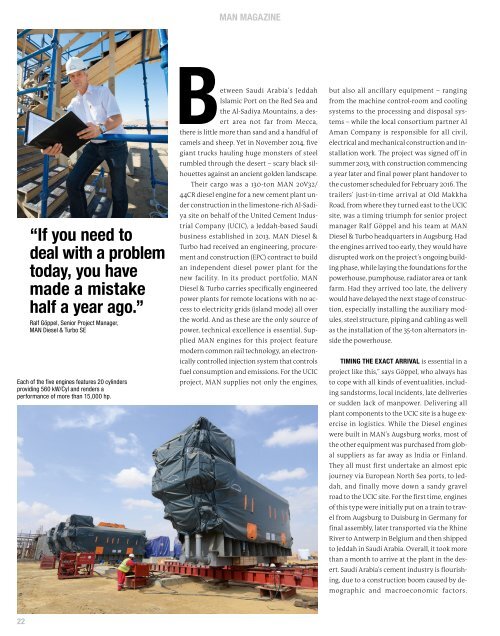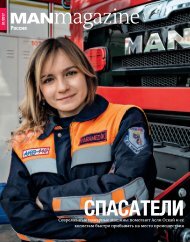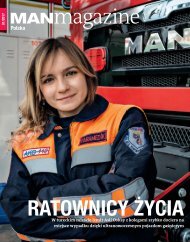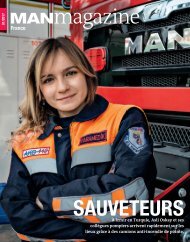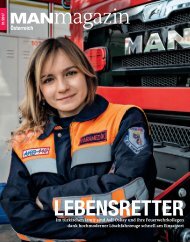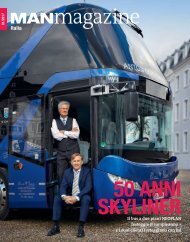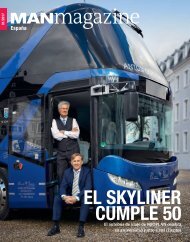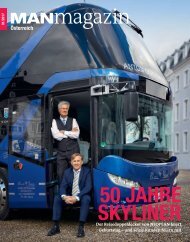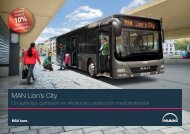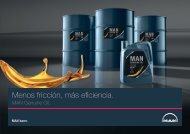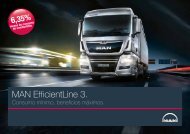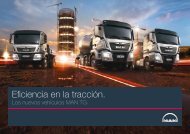MANmagazine Turbo 1/2015
With the MANmagazine by MAN Diesel & Turbo, we invite you to explore our universe of versatile technology. Join us on a world tour to Ecuador, Saudi Arabia, China and Switzerland to discover the fascinating and awe-inspiring details of cutting-edge power, marine and turbo applications.
With the MANmagazine by MAN Diesel & Turbo, we invite you to explore our universe of versatile technology. Join us on a world tour to Ecuador, Saudi Arabia, China and Switzerland to discover the fascinating and awe-inspiring details of cutting-edge power, marine and turbo applications.
Create successful ePaper yourself
Turn your PDF publications into a flip-book with our unique Google optimized e-Paper software.
man magazine 1/<strong>2015</strong><br />
“If you need to<br />
deal with a problem<br />
today, you have<br />
made a mistake<br />
half a year ago.”<br />
Ralf Göppel, Senior Project Manager,<br />
MAN Diesel & <strong>Turbo</strong> SE<br />
Each of the five engines features 20 cylinders<br />
providing 560 kW/Cyl and renders a<br />
performance of more than 15,000 hp.<br />
Between Saudi Arabia’s Jeddah<br />
Islamic Port on the Red Sea and<br />
the Al-Sadiya Mountains, a desert<br />
area not far from Mecca,<br />
there is little more than sand and a handful of<br />
camels and sheep. Yet in November 2014, five<br />
giant trucks hauling huge monsters of steel<br />
rumbled through the desert – scary black silhouettes<br />
against an ancient golden landscape.<br />
Their cargo was a 130-ton MAN 20V32/<br />
44CR diesel engine for a new cement plant under<br />
construction in the limestone-rich Al-Sadiya<br />
site on behalf of the United Cement Industrial<br />
Company (UCIC), a Jeddah-based Saudi<br />
business established in 2013. MAN Diesel &<br />
<strong>Turbo</strong> had received an engineering, procurement<br />
and construction (EPC) contract to build<br />
an independent diesel power plant for the<br />
new facility. In its product portfolio, MAN<br />
Diesel & <strong>Turbo</strong> carries specifically engineered<br />
power plants for remote locations with no access<br />
to electricity grids (island mode) all over<br />
the world. And as these are the only source of<br />
power, technical excellence is essential. Supplied<br />
MAN engines for this project feature<br />
modern common rail technology, an electronically<br />
controlled injection system that controls<br />
fuel consumption and emissions. For the UCIC<br />
project, MAN supplies not only the engines,<br />
but also all ancillary equipment – ranging<br />
from the machine control-room and cooling<br />
systems to the processing and disposal systems<br />
– while the local consortium partner Al<br />
Aman Company is responsible for all civil,<br />
electrical and mechanical construction and installation<br />
work. The project was signed off in<br />
summer 2013, with construction commencing<br />
a year later and final power plant handover to<br />
the customer scheduled for February 2016. The<br />
trailers’ just-in-time arrival at Old Makkha<br />
Road, from where they turned east to the UCIC<br />
site, was a timing triumph for senior project<br />
manager Ralf Göppel and his team at MAN<br />
Diesel & <strong>Turbo</strong> headquarters in Augsburg. Had<br />
the engines arrived too early, they would have<br />
disrupted work on the project’s ongoing building<br />
phase, while laying the foundations for the<br />
powerhouse, pumphouse, radiator area or tank<br />
farm. Had they arrived too late, the delivery<br />
would have delayed the next stage of construction,<br />
especially installing the auxiliary modules,<br />
steel structure, piping and cabling as well<br />
as the installation of the 35-ton alternators inside<br />
the powerhouse.<br />
Timing the exact arrival is essential in a<br />
project like this,” says Göppel, who always has<br />
to cope with all kinds of eventualities, including<br />
sandstorms, local incidents, late deliveries<br />
or sudden lack of manpower. Delivering all<br />
plant components to the UCIC site is a huge exercise<br />
in logistics. While the Diesel engines<br />
were built in MAN’s Augsburg works, most of<br />
the other equipment was purchased from global<br />
suppliers as far away as India or Finland.<br />
They all must first undertake an almost epic<br />
journey via European North Sea ports, to Jeddah,<br />
and finally move down a sandy gravel<br />
road to the UCIC site. For the first time, engines<br />
of this type were initially put on a train to travel<br />
from Augsburg to Duisburg in Germany for<br />
final assembly, later transported via the Rhine<br />
River to Antwerp in Belgium and then shipped<br />
to Jeddah in Saudi Arabia. Overall, it took more<br />
than a month to arrive at the plant in the desert.<br />
Saudi Arabia’s cement industry is flourishing,<br />
due to a construction boom caused by demographic<br />
and macroeconomic factors.<br />
Photos: Waleed Bin Talip<br />
The MAN team meets with project<br />
engineers to discuss the last preparations<br />
before the first engine arrives.<br />
50°C<br />
during daytime<br />
Crippling ambient temperatures are just<br />
one of the challenges when working in<br />
the desert. Others are sandstorms and<br />
even flooding episodes.<br />
A growing population and changing family<br />
structures – such as the trend toward smaller<br />
households – are increasing demand for residential<br />
properties and new industrial areas, including<br />
big oil refineries. At the same time, the<br />
government vastly increased infrastructure<br />
spending since 2013, resulting from a great year<br />
for the oil industry in 2012 and an associated<br />
20% surplus in GDP.<br />
This has turned the kingdom into the largest<br />
projects market in the Middle East, according<br />
to the “Saudi Arabia Projects Market 2014”<br />
issued by MEED, a Middle East business intelligence<br />
provider. “Saudi Arabia is a key market<br />
for our power plants division, where we have<br />
gathered decades of experience,” says Howard<br />
Barnes, Senior Vice President and Global Head<br />
of Sales Power Plants. The UCIC power plant will<br />
supply 55 megawatts , facilitating a cement production<br />
capacity of around 5,000 tons per day.<br />
Remote sites are, by nature, difficult to access<br />
and each project presents its own engineering<br />
and logistical challenges. The engines at UCIC<br />
were designed to withstand local conditions,<br />
including temperatures of up to 50°C. Special<br />
pulse filter systems in front of the air-intake<br />
ducts keep sand particles out, using compressed<br />
air to blow air filters free when sensors<br />
register a loss of air-intake pressure, while a<br />
huge system of radiator coolers is designed to<br />
regulate the cooling water systems.<br />
Göppel describes his Saudi-specific challenges<br />
as: “Sandstorms! Ramadan! Heavy<br />
rain!” In spring and summer, the northwesterly<br />
Shamal wind creates sandstorms that can<br />
cut visibility to almost zero. In 2014, such<br />
storms interrupted onsite work almost every<br />
afternoon from June through August. Although<br />
rare, rain is also a problem, as cities<br />
and environs are not equipped with rainwater<br />
drains. Jeddah was completely flooded after<br />
heavy rainfalls back in 2010, with hundreds of<br />
people killed. “When it started to rain in November<br />
2014, the workers panicked and left to<br />
reach their families,” recalls Göppel. Also that<br />
year, Ramadan, the ninth month of the Islamic<br />
calendar, proceeded during the month of<br />
July, when daytime temperatures reached<br />
50°C in the shade – if there was any shade.<br />
While faithful Muslims may work throughout<br />
this period, they must fast during daylight<br />
hours. Göppel solved the issue by switching<br />
work shifts to night time during the month of<br />
Ramadan. Another aspect slowing down work<br />
schedules are the five required prayer sessions<br />
per day. “We expect less daily progress in Saudi<br />
Arabia than in other countries, which must<br />
be reflected by work schedules,” says Göppel.<br />
For the four weeks of Ramadan, for example,<br />
he calculates a 50% reduction in progress and<br />
even 70% less efficiency during the annual<br />
fortnight Eid and Hajj holidays. A vital factor<br />
is the skilled MAN team of managers and supervisors<br />
on site, who are coordinating and<br />
driving the construction efforts. Some remain<br />
in the desert of Saudi Arabia for a year or even<br />
longer. On average, MAN has between 18 and<br />
22 months to finalize a power plant project,<br />
with significant fines and penalties built into<br />
the contract for late handover to the customer.<br />
“It’s important to quickly identify any real<br />
problems and how to address them,” says Göppel,<br />
who claims that almost nothing can ruffle<br />
him anymore. “When you have a great team<br />
like mine, be it on site or at headquarters, this<br />
is the most exciting job in the world.”<br />
22 23


